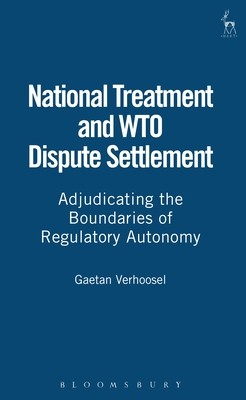
- We will send in 10–14 business days.
- Author: Gaetan Verhoosel
- Publisher: Hart Publishing
- ISBN-10: 1841132993
- ISBN-13: 9781841132990
- Format: 14 x 21.6 x 1 cm, hardcover
- Language: English
- SAVE -10% with code: EXTRA
Reviews
Description
The perceived impact of WTO law on the domestic regulatory autonomy of WTO Members is increasingly becoming the subject of controversy and debate. This book brings together in an integrated analytical framework the main WTO parameters defining the interface between the WTO and domestic legal orders, and examines how WTO adjudicators, i.e. panels and the Appellate Body, have construed those rules. A critical analysis identifies the flaws or weaknesses of these quasi-judicial solutions and their potential consequences for Members' regulatory autonomy. In an attempt to identify a more proper balance between WTO law and regulatory autonomy, it develops an innovative interpretation of the National Treatment obligations in GATT and GATS, drawing upon compelling arguments from legal, logic and economic theory
EXTRA 10 % discount with code: EXTRA
The promotion ends in 18d.03:43:20
The discount code is valid when purchasing from 10 €. Discounts do not stack.
- Author: Gaetan Verhoosel
- Publisher: Hart Publishing
- ISBN-10: 1841132993
- ISBN-13: 9781841132990
- Format: 14 x 21.6 x 1 cm, hardcover
- Language: English English
The perceived impact of WTO law on the domestic regulatory autonomy of WTO Members is increasingly becoming the subject of controversy and debate. This book brings together in an integrated analytical framework the main WTO parameters defining the interface between the WTO and domestic legal orders, and examines how WTO adjudicators, i.e. panels and the Appellate Body, have construed those rules. A critical analysis identifies the flaws or weaknesses of these quasi-judicial solutions and their potential consequences for Members' regulatory autonomy. In an attempt to identify a more proper balance between WTO law and regulatory autonomy, it develops an innovative interpretation of the National Treatment obligations in GATT and GATS, drawing upon compelling arguments from legal, logic and economic theory


Reviews